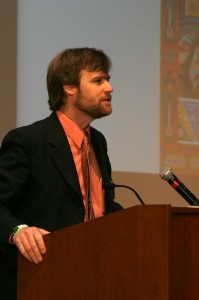Guest blog by Ethan Casey: What does Pakistan have to do with Haiti?
For me personally Haiti feels like home, because I was sixteen years old the first time I set foot here. It has taught me much, if not most, of whatever I now know about the world, and my early experience of Haiti suffused my later responses to very different countries, particularly during the five years I lived in Asia in the 1990s. I saw chronically desperate Cambodia, and tortured Burma, and deforested Thailand, with the eyes of one who had seen Haiti. In a phone conversation in 2004 Tracy Kidder, author of the celebrated book Mountains Beyond Mountains, told me something I implicitly understand and relate to: “I’ve learned so much about the world from Haiti – some of which I almost wish I hadn’t learned.”
Two things have been on my mind since Ben Owen, Pete Sabo and I arrived here on August 25. One is how, not quite eight months after the January 12 earthquake that killed perhaps 300,000 people, life here seems to have returned to something like normal. I hasten to add that that doesn’t mean everything’s fine – it’s not. Normal in Haiti is far from fine.
But my friend Gerald Oriol Jr., of Fondation J’Aime Haiti, notes how the tent cities that have taken over virtually all open spaces in Port-au-Prince have settled into a version of regular neighborhood life, with cyber cafes and hair salons. “It’s funny how an abnormal situation can be normal,” says Gerald, who belongs to Haiti’s elite class. “The only people who are truly shocked right now are people like me. But for the poor, things were so hard for them already that it’s just another way to organize themselves. Maybe it’s even better for them now.”
“The other difference is that many of them lost family and friends,” I pointed out.
“Yes, of course,” agreed Gerald. “I know a guy who lost his five children and his wife. But materially they are no worse off.”
The other thing I’ve been thinking about is the disturbingly weird coincidence of the two countries that are most important to me personally being struck in the same year by appalling disasters. The outpouring of generosity towards Haiti after the earthquake was extraordinary and welcome, but it will remain meaningful only if Americans continue noticing Haiti and, beyond giving money, make the effort to understand its situation. The earthquake was a natural disaster, but it didn’t happen in a geopolitical vacuum. This country, these people, that we cared so deeply about circa January and February – who are they, and what are they all about? Haitians are more and other than charity cases. They’re human beings with a culture and a politics and a national history closely intertwined with our own. We owe it to them and to ourselves to know them.
I came here because I share the human tendency to forget, and I want to do my part to work against it. But just as I was preparing for this trip in late July and early August, I was distracted by the floods in Pakistan, about which suffice it to say that they’re proving as devastating in every way as the Haitian earthquake, with the difference that Pakistan is a nation of not 8 million but 170 million people. It’s also a Muslim nation with nuclear weapons, but that’s not the point. The point – which I fear many Americans have ignored or denied – is that Pakistanis are people who are suffering and will continue to suffer, as food shortages caused by the destruction of crops ramify through Pakistani society over the coming months and beyond.
My question for Americans is: If we failed or refused to understand at the time it happened that the flooding was not some divine comeuppance safely distant from us, but an immense human tragedy, will we understand a year from now when, God forbid, the ricochets from it hit us closer to home?
Many Pakistani friends of mine responded immediately and with real sympathy, concretely expressed, after the Haitian earthquake. Todd Shea claims that, of the 200 or so physicians from North America who volunteered with him in Haiti, most were Pakistani. We have a golden opportunity to show similar human concern for Pakistanis, now and later.
An August 23 note from Uzma Shah is typical of the many messages I’ve received since publishing my previous article “Pakistan Floods: Why Should We Care?”: “It’s hard to see pictures from Pakistan, and I can’t help but choke back tears when I see all that desperation. And amidst all the furor about all things bad and hard about Pakistan and ‘Islam,’ it’s comforting to read your article. Because at the end of the day, we are all human, living in one world, sharing the same life.”
It’s dismaying to me that I’ve gotten very few such messages from non-Muslims.
ETHAN CASEY is the author of the travel books Alive and Well in Pakistan: A Human Journey in a Dangerous Time (2004) and Overtaken By Events: A Pakistan Road Trip (2010). He is currently writing Bearing the Bruise: A Lifetime in Haiti for publication in spring 2011. He can be emailed at ethan@ethancasey.com and his books and articles are available online at www.ethancasey.com/books/ and www.facebook.com/ethancaseyfans. Until further notice, he is donating 20% of profits from sales of his Pakistan books to flood relief in Pakistan, and from his Haiti book to Fondation J’Aime Haiti and the Colorado Haiti Project.
RSS feed for comments on this post. TrackBack URI
